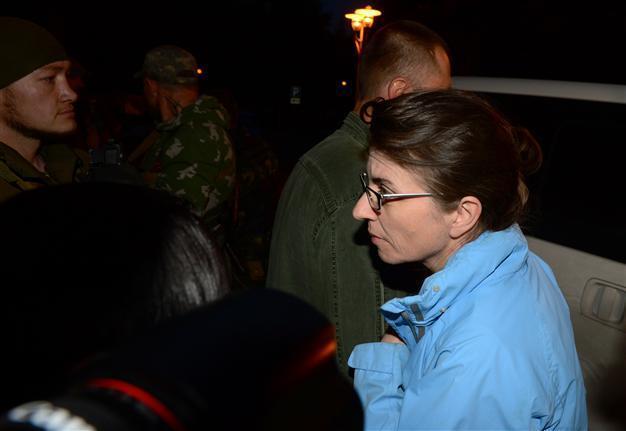Pro-Russian rebels in Ukraine free second group of OSCE monitors
DONETSK - Reuters

A member of the Organisation for Security and Cooperation in Europe (OSCE) detained by pro-Russian seperatists at the end of May walks after her release in Donestk, eastern Ukraine, on June 28. AFP Photo
Pro-Russian separatist rebels in eastern Ukraine on June 29 released a second group of four monitors from the Organization for Security and Cooperation in Europe (OSCE) who had been seized on May 29.Their release, which followed the freeing of another group of OSCE monitors early on June 27 came after Ukrainian President Petro Poroshenko announced a 72-hour extension to a ceasefire until June 30 night. That ceasefire appeared under threat when three members of the Ukrainian military were killed in a rebel attack on their post near the eastern city of Slaviansk.
The four monitors - three men and a woman - were driven by heavily armed men up to the entrance of a hotel in the eastern city of Donetsk.
A first group of OSCE monitors, including Turkish observer Mehmet Kılıç, seized days earlier by pro-Russian separatists, were released in the early hours of June 27.
The OSCE monitoring groups are part of a 300-strong force sent there to observe compliance with a four-way agreement in Geneva in April aimed at defusing the crisis in Ukraine's east.
A ceasefire extension until June 30 night announced by Poroshenko called for the release of "hostages" held by both sides. But elsewhere on June 29 the ceasefire appeared under threat when three members of the Ukrainian military were killed in a rebel attack on their post near the eastern flashpoint city of Slaviansk.
"As a result of the (rebel) fighters shooting at the post near Slaviansk, three members of the Ukrainian forces were killed and a fourth was wounded," the spokesman, Oleksiy Dmitrashkovsky, was quoted as saying by the Interfax news agency.
Poroshenko announced the extension, partly at the urging of some European leaders, after returning to Kiev from a European Union summit in Brussels where he signed a landmark free trade pact.
















